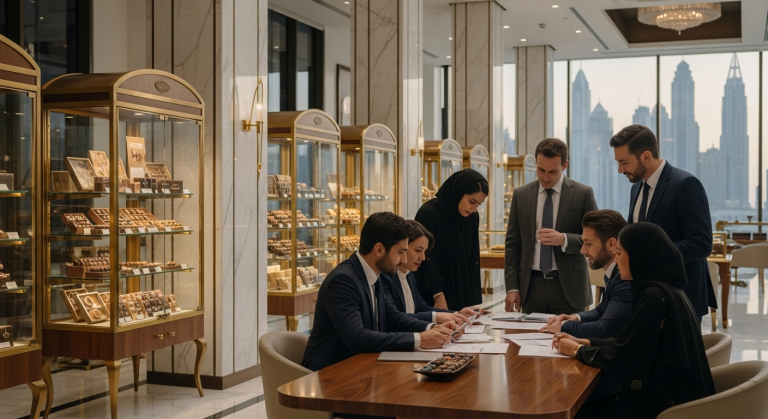Market Analysis and Opportunities
The specialty chocolate production sector represents a compelling business opportunity in Dubai, capitalizing on the emirate’s sophisticated market, multicultural consumer base, and reputation as a global luxury hub. As a pivotal part of the broader food and beverage industry, specialty chocolate ventures offer both B2B and B2C prospects, growing in relevance amid evolving UAE consumer tastes and increasing demand for premium, artisanal experiences.
According to Statista, the UAE chocolate market exceeded USD 425 million in 2023, with an anticipated CAGR of 6.5% through 2028. Specialty chocolates—featuring unique flavors, ethical sourcing, and bespoke packaging—are outpacing conventional products, driven by Dubai’s expanding young professional population, rising tourism numbers, and direct-to-consumer innovation.
Analyzing the market in Dubai reveals several key dynamics:
- Rising demand for luxury and health-conscious confectionery, such as organic, vegan, and sugar-free chocolate options.
- Increased appreciation for artisanal craftsmanship and origin-traceable ingredients, especially among Emirati nationals and expatriates.
- Significant gifting culture, particularly during festive seasons like Ramadan, Eid, Diwali, and Christmas.
- Influence of digital transformation, with e-commerce platforms, online marketing, and influencer-led campaigns driving brand discovery.
Businesses must conduct granular market research, tailoring offerings and marketing initiatives to Dubai’s competitive and ever-evolving landscape. Investment in digital campaigns—SEO, PPC, and targeted social media—paired with strategic branding, can significantly enhance market penetration and consumer loyalty.
Comprehensive Business Overview
Specialty chocolate production refers to crafting and distributing premium chocolates distinguished by high-quality ingredients, unique recipes, creative packaging, and ethical sourcing. The business model generally encompasses:
- Production: Small-batch manufacturing, focusing on taste innovation and value-added features (e.g., organic, single-origin, sugar-free).
- Distribution: Direct-to-consumer (retail outlets, online stores) and B2B (partnerships with hotels, cafes, or retailers).
- Experience: Chocolaterie boutiques, chocolate-making masterclasses, and exclusive tasting events.
Target Audience includes high-income residents, tourists, corporates (for corporate gifting), and retail clients seeking luxury or health-conscious options.
Operational Scope in Dubai covers end-to-end operations, from sourcing raw materials (often via global supply chains) to crafting chocolates in local facilities, and selling through multi-channel distribution.
Mission: To provide Dubai’s diverse clientele with premium, innovative chocolates that deliver both luxury and sustainability.
Vision: Be recognized as Dubai’s leading specialty chocolate producer, setting benchmarks in taste, ethics, and consumer experience.
Objectives:
- Deliver superior-quality, unique chocolate products tailored to UAE preferences.
- Scale production and expand into new market segments across the GCC.
- Champion sustainability and transparent supply chains.
Business Stage: This opportunity is particularly attractive for startups and early-stage growth businesses, targeting either the Dubai Free Zone (to maximize tax and business setup advantages) or the Mainland for broader onshore reach.
Competitive Advantage
Entrepreneur Perspective
- Access to Dubai’s supportive entrepreneurial ecosystem, including free zones like Dubai Multi Commodities Centre (DMCC) offering streamlined business setup, 100% foreign ownership, and world-class facilities.
- Proximity to affluent consumers and lucrative contracts with luxury hotels, airlines, and event planners.
- Ability to experiment with innovative recipes, personalized offerings, and eco-friendly packaging to stand out.
Investor Perspective
- Strong ROI potential based on Dubai’s sustained tourism growth (16.7 million international visitors in 2023, per DTCM).
- Opportunities for brand differentiation via proprietary blends, exclusive collaborations (e.g., local chefs, international chocolatiers), or direct platform technology for customer loyalty.
- Business models are highly scalable, with potential for regional franchising, corporate gifting programs, or global export.
Manager Perspective
- Operational efficiency driven by advanced supply chain infrastructure (Jebel Ali Port, Dubai Airport).
- Access to skilled talent, modern food production technology, and supply chain digitization tools.
- Potential to streamline workflows with ERP solutions, quality assurance systems, and strong retail partnerships.
Market Analysis and Consumer Insights
Target Market & Growth Dynamics
- The UAE chocolate sector is forecasted to reach over USD 550 million by 2028, with Dubai accounting for the lion’s share due to its cosmopolitan demographics and robust hospitality sector.
- Young professionals, high-income families, and tourists represent high-value consumer segments seeking unique flavors and transparent sourcing.
- Corporate clients (hotels, airlines, events) present consistent demand for premium gifting and branded signature chocolates.
Consumer Preferences & Purchasing Patterns
- Emphasis on authenticity, origin, and wellness attributes (e.g., dark chocolate, single-origin, vegan, nut-free).
- Online retail is rapidly gaining traction—consumers increasingly research, compare, and order chocolates via digital channels.
- Social media and influencer recommendations significantly impact purchase decisions, underscoring the need for compelling digital storytelling.
- Seasonal and festive demand spikes require agile production and inventory management.
Emerging Industry Trends
- Growing demand for sustainable packaging, eco-certifications, fair trade, and locally sourced ingredients.
- Digitization of customer engagement—use of apps, QR codes, online chocolate design tools.
- Integration of experiential retail (in-store tastings, chocolate workshops, pop-up events).
Marketing Needs and Tactics
- Data-driven market research to refine products, pricing, and positioning.
- Invest in high-impact digital campaigns (SEO, Google Ads, and paid social media ads) targeting Dubai’s specific buyer personas.
- Collaborate with influencers and luxury lifestyle media to build prestige and market buzz.
- Develop a loyalty program and leverage CRM systems for personalized engagement and repeat sales.
- Leverage resources such as Sales and Advertising Services to optimize outreach in Dubai.
Expansion and Diversification Opportunities
- Geographic: Target other GCC markets via Dubai-based exports, leveraging the city’s strategic trade links.
- Segment: Develop collections for niche markets (e.g., health-conscious, luxury gifting, corporate gifting, weddings).
- Channel: Expand presence in high-end supermarkets, specialty stores, airports, and five-star hotels.
Financial and Investment Needs
Estimated Capital Requirements
- Setup costs (licensing, incorporation, facility leasing/equipment): AED 500,000–1,200,000 depending on factory size and location (Free Zone vs. Mainland).
- Production equipment (machinery, molds, packaging lines): AED 300,000–600,000 for quality-focused small-batch operations.
- Marketing & launch (digital ads, PR, events): AED 250,000–500,000 for comprehensive Dubai market entry.
- Working capital (inventory, payroll, R&D): AED 300,000–700,000 for the first 12 months.
Investment Potential
- Attractive ROI: Premium pricing, high repeat purchase rates, and brand premium margins yield robust profit potential.
- Scalability: Modular production facilities, franchising and e-commerce expansion enable rapid scaling.
- Market resilience: Luxury chocolates are less price-sensitive, maintaining demand during market fluctuations.
- Consider investment structures such as equity partnerships for scaling, or raising venture capital for technology-driven growth; see investment consulting services for guidance.
Financial Risks and Mitigation
- Cash Flow Challenges: High upfront OPEX can stress liquidity—mitigate with phased investment and robust financial planning.
- Currency Fluctuations: Hedging strategies for ingredient imports (e.g., cocoa, sugar) to minimize forex risk.
- Regulatory Costs: Stay proactive on compliance, utilize Free Zone incentives, and consult local business advisors.
- Diversification: Launch chocolate-making classes, corporate workshops, or expand into B2B channels for resilient revenue.
Human Resources and Recruitment
Workforce Needs
- Production: Chocolatiers, food technologists, quality assurance specialists (4–8 FTE for a startup).
- Sales & Marketing: Digital marketers, brand managers, customer relations (2–5 FTE).
- Operations: Logistics coordinator, procurement specialist, administration (2–4 FTE).
Critical expertise includes:
- Artisanal chocolate craftsmanship
- F&B operations management
- Multilingual marketing and sales skills
- Knowledge of UAE food safety regulations
HR Challenges and Solutions
- Attracting talent: Offer competitive compensation, growth opportunities, and clear career paths.
- Retention: Foster a collaborative, innovative culture with incentives and professional development programs.
- Training: Implement ongoing upskilling in product knowledge, food safety, and customer service.
Compliance with UAE Labor Laws
- Visa sponsorship for qualified foreign staff (handled via Free Zone or Mainland licensing authorities).
- Compliant contracts, timely payment, and adherence to end-of-service benefit rules.
- Ensure diversity and inclusivity, aligning HR policies with UAE nationals’ employment regulations where applicable.
Infrastructure and Operations
Infrastructure Needs
- Production: HACCP-certified kitchen, climate-controlled storage, packaging equipment.
- Retail: Branded boutique store in a high-footfall location (mall or high-street).
- Digital: Secure website, e-commerce platform, integrated POS system, and cloud-based ERP.
- Cost management: Leverage co-working kitchens or shared production spaces in Dubai Free Zones for early-stage cost efficiency.
Operational Optimization
- Strengthen local supply chain partnerships to reduce lead times and secure ingredient quality.
- Adopt automation (machinery, order processing tools) for scaling and consistency.
- Implement lean management and real-time inventory systems to minimize waste and optimize cash flow.
Legal Compliance
- Register operations with appropriate authorities—Dubai Economic Department (DED) or relevant Free Zone authority.
- Obtain necessary F&B licenses, food safety certification, and product approvals as per DM regulations.
- Open a corporate bank account compliant with UAE’s anti-money laundering (AML) rules.
- For setup and ongoing support, consider business setup services.
Innovation and Technology
- Digitize marketing and customer engagement through an integrated e-commerce platform and loyalty apps.
- Utilize blockchain for transparent ingredient tracking and provenance validation.
- Adopt food production IoT devices for quality control and traceability.
Marketing and Branding Strategies
Brand Status
- Artisan positioning creates instant appeal among Dubai’s premium clientele; reinforce with unique brand stories and sustainability narratives.
- Distinct visual identity—modern packaging, logo, and digital presence is essential for recall and differentiation.
- Areas for improvement: Invest in PR, build partner collaborations, and become a recognized player at gourmet food events.
Marketing Channels
- SEO-optimized website, with digital content targeting phrases like “Dubai luxury chocolate” and “premium chocolate gifting.”
- Active presence on Instagram, Facebook, and TikTok to showcase product visuals and experiential content.
- Leverage PPC, Google Shopping, and retargeted ads to capture high-intent traffic.
- Complement digital marketing with traditional PR (magazines, newspapers) and strategic mall pop-ups.
360-Degree Campaigns
- Example: Launch an Eid luxury chocolate collection with influencer unboxings, retail displays, and an online pre-order campaign.
- Host chocolate tasting workshops posted on social media and supported by email marketing to drive engagement and footfall.
- Integrate paid ads, organic content, and offline events for maximum reach and cross-channel synergy.
- Stay updated with marketing trends from the industry blog.
Growth and Development Potential
Growth Strategies
- Strategic partnerships with 5-star hotels, airport retailers, and corporate gifting agencies to expand distribution.
- Establish region-wide franchise models, leveraging the success of flagship Dubai boutiques.
- Secure distribution contracts through participation in F&B expos and networking with trade associations.
Networking Opportunities
- Leverage Dubai Chamber of Commerce, GCC trade associations, and luxury F&B networks to find suppliers, buyers, and co-branding opportunities.
- Partner with logistics and export players for smooth expansion into the GCC and Africa.
- Consult platforms like Persian Horizon for tailored market linkage and expansion support.
International Potential
- Dubai’s global connectivity and proximity to Africa, Europe, and Asia make it a springboard for luxury chocolate exports.
- Leverage free trade agreements and global e-commerce routes via Dubai’s logistics infrastructure.
Sustainability and Innovation
- Integrate sustainable sourcing—use UTZ, Rainforest Alliance-certified cocoa, recyclable packaging, and renewable energy in production.
- Develop “zero-waste” product lines and take-back schemes for packaging, aligning with Dubai’s Vision 2030.
- Innovate with flavors inspired by regional tastes—date-infused, saffron, or oud-flavored chocolates.
Alignment with Dubai’s Market
Cultural Alignment
- Curate flavor profiles that blend international trends with regional favorites to attract Emirati and expatriate consumers alike.
- Offer bilingual packaging and in-store experiences (Arabic and English) for maximum inclusivity.
- Celebrate UAE traditions through limited-edition holiday collections.
Regulatory Compliance
- Ensure strict compliance with UAE’s commercial, tax, and labor statutes, including VAT registration and ESR.
- Engage a business consultant to audit compliance regularly and update processes as laws evolve.
Leveraging Dubai’s Advantages
- Access to world-class logistics, tax-free zones, and an efficient legal system (one-stop government portals).
- Consistent flow of international tourists and trade delegates eager for premium and exclusive products.
- Proximity to top-tier suppliers and retail partners accelerates scaling and risk diversification.
Overcoming Local Challenges
- High Competition: Stand out with proprietary recipes, unique sustainability stories, and granular targeting of untapped segments.
- Cost Pressures: Optimize OPEX via lean operations, shared facilities, and phased investment.
- Regulatory Hurdles: Engage experienced advisors and use Free Zone benefits to navigate setup and compliance efficiently.
- Talent Retention: Prioritize culture, competitive pay, and clear progression planning.
Conclusion
Specialty chocolate production in Dubai offers robust prospects for entrepreneurs, investors, and managers eager to tap into the UAE’s growing appetite for premium, innovative foods. With careful market research, creative product positioning, and efficient back-end processes, this business can capture both local and regional demand, expand internationally, and build a sustainable, brand-driven enterprise. Strategic use of digital marketing, adherence to legal frameworks, and alignment with Dubai’s unique business landscape are vital for success.
Call to Action
For stakeholders interested in establishing or scaling a specialty chocolate venture in Dubai, leveraging expert support is critical. Explore business setup, investment consulting, and growth services from Persian Horizon to unlock Dubai’s full potential—your gateway to regional and global chocolate market success.







